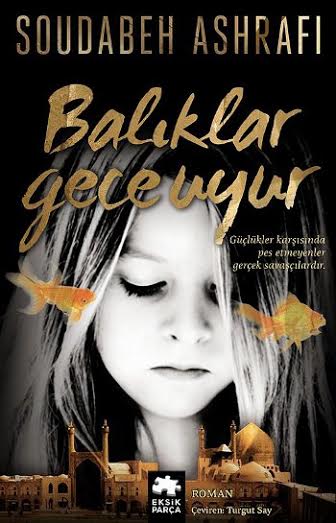Four books from four female authors have been selected to promote Iranian literature and its female authors on the eyes of the readers. Our writing series which explains the role of female authors in Iranian literature is divided into two parts. The first part deals with women writers in Iran, while the second part hosts women authors and their works who are in exile.
From the books we have just presented, Zoya Pirzad’s “I Let the lights go out” novel has been translated into Turkish by Emrullah Yakut from Aras Publications.
Sepideh Shamloo, born in Tehran, 1968. Writer and film critic.
“As if you had said Leylie” – 2001 Hooshang Golshiri Literature Award.
The book is a story of love, death and enlightenment. Leyla, the chief hero of the book, never actually appears in the book. The reader literally stays in the book like Majnun pursuing Leyla. The heroes of the book are Sharare, Mestane and Ali. Ali is the husband of Sharare, who died in the war thirteen years ago, and the brother of Mestane. Sharare and Mestane are also narrating their own lives while telling stories about Ali. While Sharare tells the story of growing her son as a widow for thirteen years, Mestane describes Ali and Sharare.
Ali’s mother is an elderly woman whose mind is imbalanced and does not be able to accept her son’s death. While trying to keep her dreams together with her son in her dreams, she is completely sane and accepts the death of Ali. While Sharare and Mestane are also telling about Ali, they do not behave differently than their mothers.
In this novel, women always want to be like Leyla while searching for love, but no one desires to be followed by a madman (Majnun) in their pursuit! The book reveals a world without a beginning or an end where life is dead, love is insensitive, light is lost in the darkness.
Shiva Arastooyi, was born in 1961 in Tehran. She studied English Literature. In Iranian literature, she is one of the important names in short stories and among the most famous Iranian women writers.
“I Became Beautiful When I Saw Her”, 2000 / Tehran
The story is told from the mouth of a girl. She tells everything to her unborn baby. This imaginary baby, whom she wants to be from the one he loves, has settled in the girl’s brain. The baby’s name is “Mahoni”. She talks to “Mahoni” about the man she loves and the little boy she met after the earthquake. She tells her adoption plan to get the little boy. She also mentions “Mahoni” a soldier who was wounded in battle and whose mental health was impaired. She speaks about this injured soldier’s, who she is obliged to look at in the hospital she works, platonic love towards her. She shares her childhood, her father, her hopes, her fears with this unborn baby.
Shiva Erestooyi tells of the fear and hopes of the Iranian people during the war years in this long story (short novel in other words). The book can be regarded as a work that can witness to the spiritual environment of all wars.
Zoya Pirzad, was born in Abadan in 1952. She has an Iranian-Armenian mother and her father is Iranian-Azerbaijan. She lives in Tehran. She has two sons, Sasha and Shervin. Many works of her have been translated into French and English.
“I’ll Turn Off the Lights”, winner of the 2002 Hooshang Golshiri literary prize
Alongside with the inspirational things she has done in Iranian literature, she also has brought a new breath to the literature of Armenian Diaspora with her original expressions. Translated in various languages, her novel “I’ll Turn Off the Lights” brings the grief of women regardless of ethnicity, class or lifestyle; the mostly invisible pressures that women are exposed to and their intense feeling of loneliness in front of our eyes with a brand new, feminine point of view.
How long can a woman in the city of Abadan/Iran keep her enduring inner life alive, with a husband who’s fed up with his wife, three growing children, a narrow social environment and endless housework that has taken a majority of her time in home?
Where is the limit of the patience of a woman who does not bother to listen to her own feelings but who always delay her own life for the sake of her family and friends who are always waiting for her help? When a handsome man with his mother and his only daughter comes to the city and begins to care about her, value her words; what changes occur in the soul of a woman who’s accustommed to be ignored? Is the emotion growing her inside love, or is it just a temporary excitement?
Sara Salar, born in 1966 in the city of Zahidan. She lives in Shiraz. Her works have been translated into German and Italian.
“Is It or Is It Not?” 2014 / Tehran
A woman on the verge of age forty goes back and questions the meaning of her life. This personal inquiry increasingly becomes a social question and begins to examine the philosophy of common life, starting with male-female relationships.
The book’s female hero describes her inner world by addressing herself in three different periods from her past. On a fine line between love and hate, she explains how her relationship with her husband has become ordinary over the years.
Death and life, love and hate, mourning and hope are merged side by side in this novel. Death and resurrection will escort the female hero of the novel in this inner questionnaire. From the daily life to our most special thoughts, in a wide range of spiritual spectrum, male and female associations, youth and old age, life and death are questioned. The simplicity and sincerity of the author’s narrative will lead the reader to a breathless journey in this quest.

